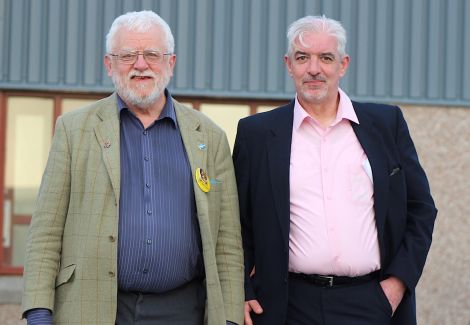Viewpoint / Election: Love fest rather than fox hunt
The Althing debate on Saturday night was billed as a hustings special, but at times felt more like a two party love-in between Labour candidate Gerry McGarvey and SNP candidate Danus Skene, writes Genevieve White.
Prior commitments had prevented Conservative and UKIP candidates from attending. Liberal Democrat incumbent Alistair Carmichael had been taken ill earlier that day, prompting Skene to comment that the event was rather like “having a fox hunt without the fox.”
For those not yet sure about their voting intentions (and I include myself in this category) the lack of representation from the other three parties was disappointing. However, it meant that the audience were able to hear more in-depth answers from the two candidates present.
Andrew Halcrow made a competent chairman, assuring the audience that what the event lacked in quantity “it would make up for in quality”. A straw poll at the outset showed that a small percentage of the 80-strong audience had yet to decide which way they were voting: the final poll revealed that most of these floating voters remained undecided at the end of the evening.
Gerry McGarvey’s opening speech focused on his own personal qualities, life experience and socialist credentials. He spoke simply and passionately about the work he had done in his community: both with adult education and the unemployed. He stressed his personal commitment to “helping people”. McGarvey urged the audience to look at the Scottish Labour manifesto online and discover for themselves its focus on fairness and the redistribution of wealth. While McGarvey’s direct style was engaging, it would have been good to hear more concrete plans about his party’s vision for the future.
Danus Skene is an erudite and articulate speaker whose knowledge of and commitment to local issues comes across clearly. His opening speech focused less on the personal and more on the key aspects of his election campaign: namely prosperity, good government and fairness. Skene spoke convincingly about the need for investment rather than austerity and the importance of redistributing wealth.
Become a member of Shetland News
He looked back to the Brown/Blair years and argued that inequality had accelerated during this time. Skene bemoaned the UK’s shocking food bank statistics and deemed the situation to be both unacceptable and unfair. This unfairness, Skene argued, extends not just to individuals and families but also to places, such as Shetland.
The two opening speeches having concluded, it was time for questions and comments from the audience. The answers revealed that the candidates were in agreement over many issues: from uniting in praise over the “our islands our future” campaign, to their emphasis on the importance of quality work with fair wages and accessible education for all. Even Quaine Bain’s calculated attempt to “disrupt the love fest” with a question on Trident failed to provoke any great discord, with McGarvey quick to stress that within both parties a range of opinions exist on this issue.
These similarities prompted Steve Davidson to ask the question “If you’re both so similar, why is Labour not considering a coalition with the SNP?” McGarvey answered that politicians go into an election with the intention of winning, not forming a collation. He added that it would be very difficult to form a coalition with a party which is doing everything it can to ruin Labour’s chances. His last word on the subject was: “If you want Labour, vote Labour. If you want SNP then vote for them.”
One of the evening’s most revealing questions came from Susan Bowie, who called into question the SNP’s commitment to redistribution of wealth. If this commitment was genuine, she asked, where was the evidence of it in SNP policies over the past seven years?
Skene’s answer was that the “pocket money parliament” simply lacked the fiscal controls to redistribute wealth. McGarvey, however, was quick to suggest a shocking reason for the SNP’s lack of action on social issues: 444 million pounds had been lying dormant, put on hold for the purposes of last year’s referendum.
Although many in the audience still had questions, the event had run out of time. This undecided voter was, at the end of the evening, still undecided. On the strength of the speeches alone, I would be inclined to choose Skene as the most able man for the job. It seems a pity that Labour was unable to field a candidate with greater local knowledge. In fact, the strongest Labour voice came from the audience, in the shape of Irvine Tait’s salient contributions.
On further reflection though, I felt that what came out of the questions and answers session was more revealing. For the SNP, nationhood will always take priority. Labour is still the party which puts class before all other issues. Ultimately, prioritising class seems the only way to address the inequality which both parties seek to remedy.
Genevieve White
Become a member of Shetland News
Shetland News is asking its many readers to consider paying for membership to get additional features and services: -
- Remove non-local ads;
- Bookmark posts to read later;
- Exclusive curated weekly newsletter;
- Hide membership messages;
- Comments open for discussion.
If you appreciate what we do and feel strongly about impartial local journalism, then please become a member of Shetland News by either making a single payment, or setting up a monthly, quarterly or yearly subscription.





























































